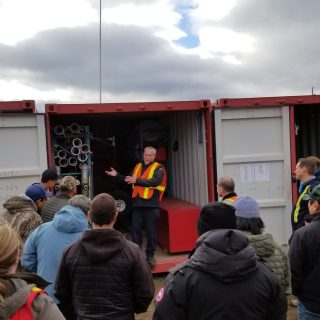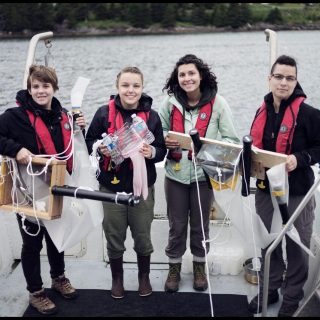Our Stories
Irving Shipbuilding and Nunavut Research Institute award $2 million to Arctic research
Funding awarded to nine research projects across Canada
HALIFAX, NOVA SCOTIA (October 4, 2016) – Today, Irving Shipbuilding Inc. and the Nunavut Research Institute (NRI) awarded $2 million in funding to nine applied Arctic research projects focused on areas of importance to Canada’s Arctic communities and the marine industry.
“From oil spills preparation, wildlife health monitoring and marine safety planning, to shipping policies and water research, the initiatives to be conducted as a result of the partnership between Irving Shipbuilding and the Nunavut Research Institute will contribute to a vibrant future for the marine research industry throughout Canada’s North,” said Joe Adla Kunuk, president, Nunavut Arctic College. “In addition to the research being conducted, this is a valuable opportunity to build our capacity to facilitate and administer funding for research in our communities.”
In June 2016, the Nunavut Research Institute issued the call for proposals. Twenty-six proposals were reviewed by an independent review committee of scientist and northern experts. The nine research projects selected by the committee to receive funding involve residents of Canada’s Arctic communities in the research, and will contribute to enhancing marine safety and improving response to marine incidents.
“We are proud to be forging links with academic institutions like the Nunavut Research Institute and the selected researchers to develop a sustainable, innovative and vibrant marine industry in Canada,” said Kevin McCoy, president, Irving Shipbuilding.
On top of Irving Shipbuilding’s $2 million in funding, the nine research projects have leveraged an additional $2.3 million from contributing partners, for a total of $4.3 million in research funding.
“The Government of Canada supports key partnerships between industry and academia, like that of Irving Shipbuilding and the Nunavut Research Institute, because they build on the organizations’ strength, enable innovation and generate economic benefits for Canadians,” said the Honourable Navdeep Bains, Minister of Innovation, Science and Economic Development. “This research will help inform policy and protect the remote and delicate ecosystems of northern communities.”
Irving Shipbuilding’s $2 million commitment is being made as part of Irving Shipbuilding’s Value Proposition commitment through Canada’s National Shipbuilding Strategy (NSS), under which Irving Shipbuilding is building Canada’s future combatant fleet.
"Our government is committed to providing new ships to the Royal Canadian Navy and the Canadian Coast Guard. The National Shipbuilding Strategy is creating jobs and long term benefits for the economy from coast to coast to coast. Investments in research projects, such as these, will strengthen the marine industry in the Arctic," said the Honourable Judy M. Foote, Minister of Public Services and Procurement.
Irving Shipbuilding is committed to spending 0.5% of contract revenues with the aim of creating a sustainable marine industry across Canada, amounting to approximately $12 million over the duration of the first contract to build Arctic and Offshore Patrol Ships (AOPS). As of September 2016, Irving Shipbuilding has committed over $6 million to organizations involved in research, education and growth of Canada’s shipbuilding and marine industries.
The nine applied Arctic research projects receiving funding are:
1. Enhancing Capacity for Arctic Oil Spill Response – Thomas Puestow, C-Core
2. Improving and Monitoring Water Quality in Nunavut – Graham Gagnon, Dalhousie University
3. Developing capacity for monitoring the effects of climate change and industry on Arctic Wildlife health – Susan Kutz and Sandie Black, University of Calgary
4. Developing Governance Best Practices for Arctic Shipping – Jackie Dawson, University of Ottawa
5. Improving Community Communication around Marine Environmental Assessments – Kevin Hanna, University of British Columbia
6. Creating Resources for Safe Marine Travel in Nunavut – Sean Guistini and Helena Craymer, Nunavut Arctic College
7. Establishing a Nunavut Weather Station Network to Support Safe Travel – Brent Else, University of Calgary
8. Integrating Genomics, Morphology and Local Ecological Knowledge to Improve Arctic Capelin Stock Management – Marie Clement, Louis Bernatchez, Pascal Sirois and Grant Murray, Université Laval, Université du Québec à Chicoutimi and Duke University
9. Tracking Trends in Ringed Seal Health in a Changing World – Pierre-Yves Daoust, University of Prince Edward Island


